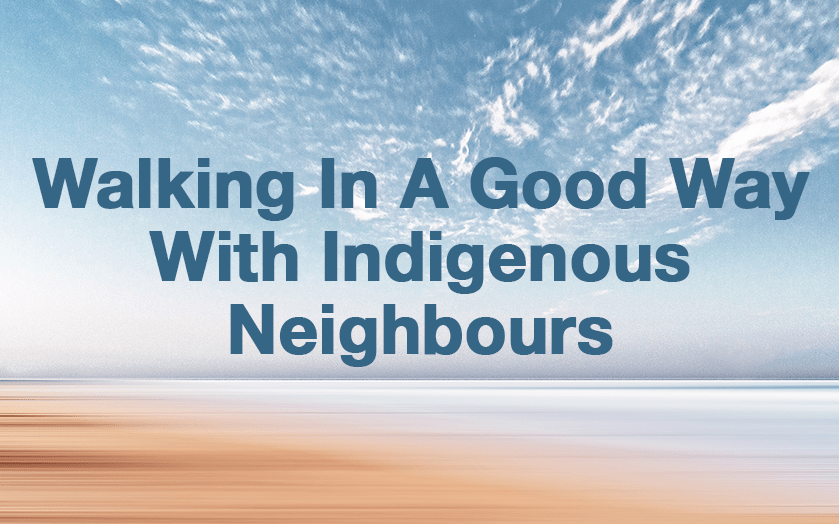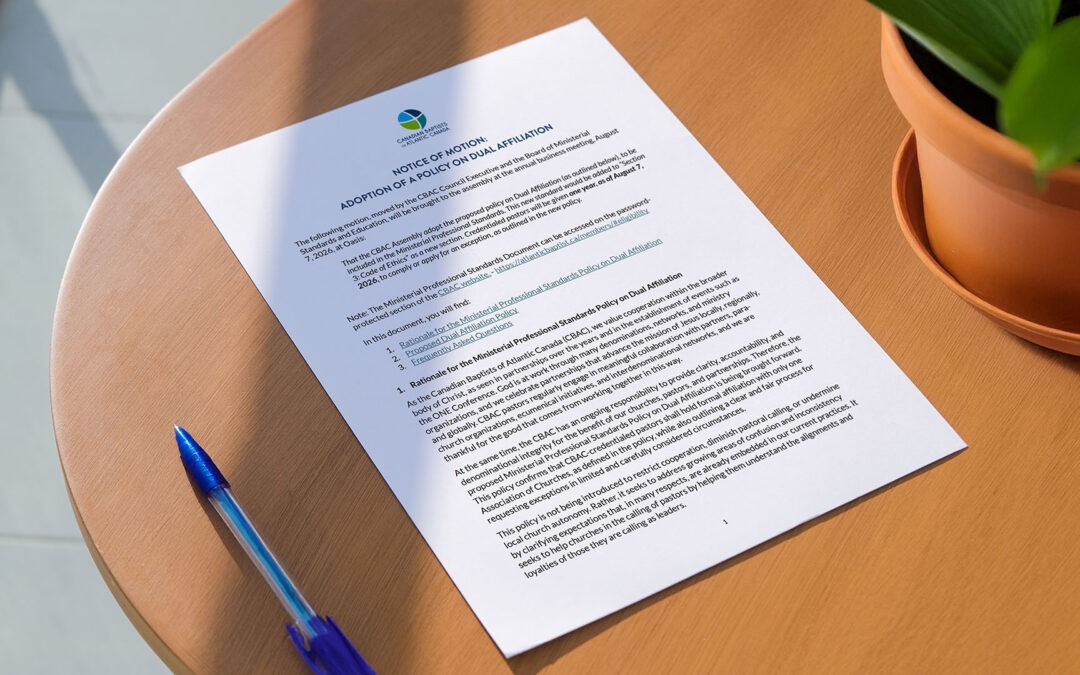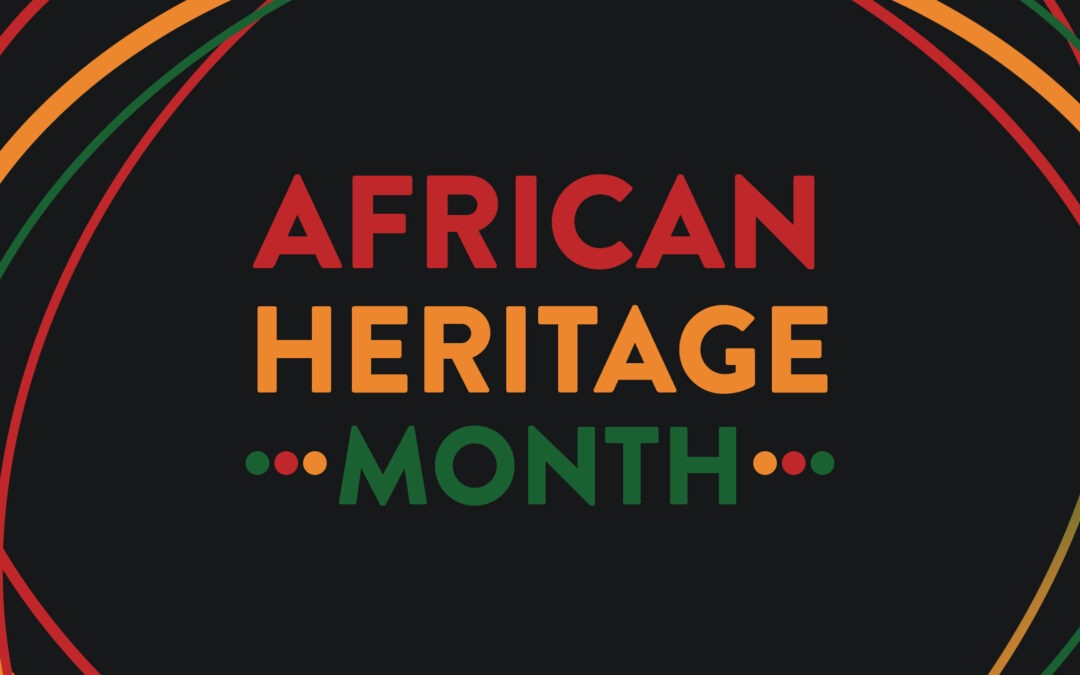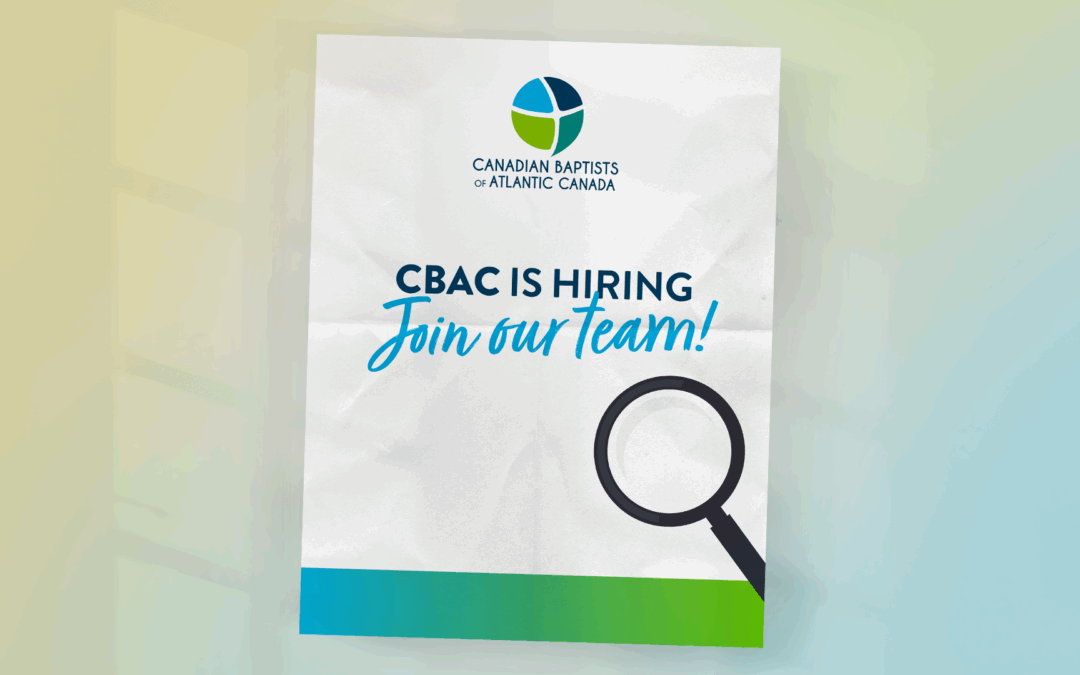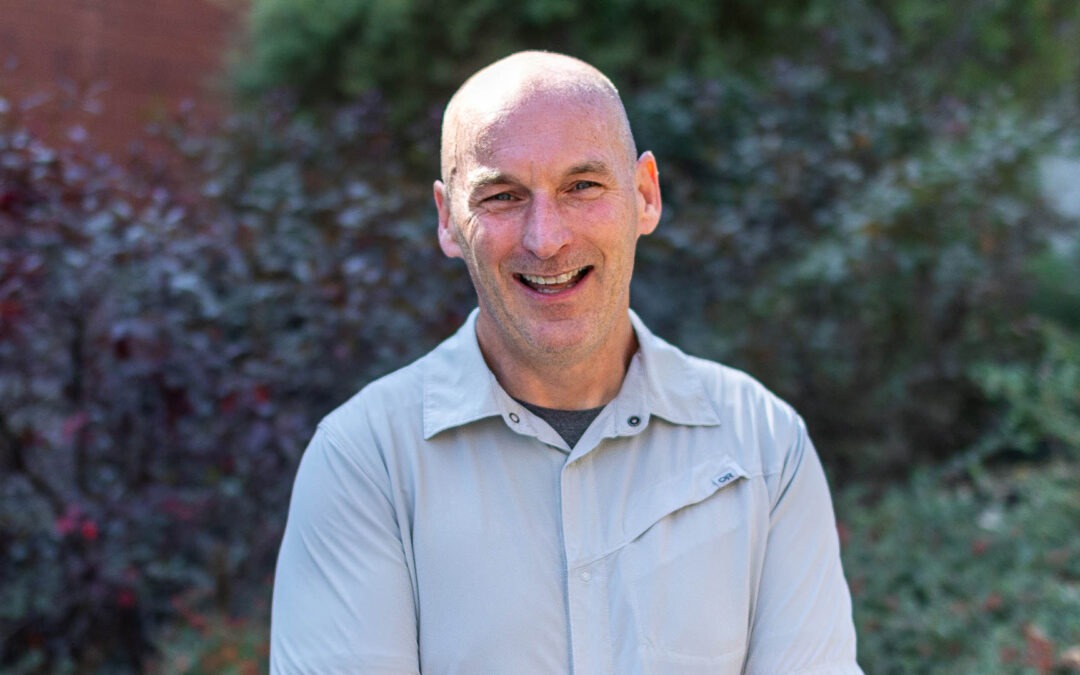Here, in its complete form, is the CBAC resolution passed at Oasis 2019, including our apology to our Indigenous neighbours.
PREAMBLE
In the beginning God created the heavens and the earth. . . Then God looked over all he had made, and he saw that it was very good! (Gen. 1:1, 31a, NLT)
All the nations you made will come and bow before you, Lord; they will praise your holy name. (Ps 86:9)
When God created the world, he designed it so that humans would live in right relationship with him, with each other, and with the rest of Creation (Gen 1–2). Theserelationships were to involve all aspects of life, something reflected in Jesus’s teaching to “love the Lord your God with all your heart and soul and mind and strength, and loveyour neighbour as yourself” (Mark 12:30-31). Despite the devastating effects of sin,God’s enduring vision for his Creation is still one of right relationship between all things(Hos 2:14-23; Rom 8; Rev 21–22).
We as Canadian Baptists of Atlantic Canada acknowledge that we have not lived in right relationship with the Indigenous peoples of this land. While we have in theory affirmed that everyone is created in the image of God (Gen 1:27), we have not recognized in practice the inherent, God-given dignity of Indigenous peoples. Despite the hospitality offered to our ancestors, we have not acknowledged the long-standing historic and official claim of Indigenous peoples to this land. We have not kept the promises our forebears made in the form of treaties, specifically the Peace and Friendship Treaties (1725-1779). And even when some of our own, such as Silas T. Rand (1810-1889), spoke out against colonialism, we ignored or silenced them.
Canada’s Truth and Reconciliation Commission (TRC) has re-emphasized the urgent need for a renewed relationship between settlers and Indigenous peoples. In 2015, the TRC released its final report after a five-year process that included hearing the stories of survivors of the Indian Residential Schools in Canada. These schools operated aspart of the assimilative policies implemented first by the British colony of the Province of Canada in 1820, and then by the federal government of Canada from the 1880s until the 1990s.These were administered by various Christian denominations. Over 150,000 First Nation, Inuit, and Métis children attended Residential Schools. In this region, there were six schools (five in Newfoundland and Labrador, and one in Nova Scotia). Attitudes and policies of colonization in Canada, which we have long endorsed by our silence and inaction, have led to painful and enduring consequences for residential school survivors and for subsequent generations of children. Canada as a nation has been awakened over the past several years to what it has done to its most vulnerable peoples. The Spirit has moved many Christian churches, denominations, and ministries to respond in word and deed, with many ministries having staff dedicated to these efforts (see appendix).
While the CBAC was not directly involved in operating any of the schools, we still bear responsibility for not taking seriously the concerns of students, their families, or their communities. We also bear responsibility for not actively opposing the political principles behind the Residential School system, especially in light of our belief in the separation of church and state. In addition to the cruelty suffered by many children in these schools, gross injustices happened through the use of Residential Schools to strip Indigenous children of their language, culture, and heritage. These have had a lasting impact on Indigenous families and communities across Canada that will continue for generations. We as a Baptist family recognize and repent of this sin. We stand guilty through our decades of silence, but now have an opportunity to acknowledge our failure to live up to the commands of the Gospel.
As part of the wider Canadian culture we have, consciously and unconsciously, supported systemic injustices like the appropriation of land, the forced relocation of Indigenous communities, the creation of the reserve system, and continued economic and political exploitation. Whether we recognize it or not, our prosperity in the Maritimes came in part through injustices and abuse done to Indigenous peoples. Our houses, our schools, our retirement homes, our churches — all of these sit on unceded territory governed by official treaties of peace and friendship. We might have claimed ignorance in the past, but ignorance can no longer be an excuse for inaction. As Canadian Baptists of Atlantic Canada, we recognize and confess our complicity in the Residential Schools and in the broader system of colonialism. We mourn the broken relationships we have caused between children, families, communities, the rest of Creation, and God, and we must humbly ask for forgiveness both from God and from Indigenous peoples.
We take seriously the scriptural direction to live in peace (Rom 12:18; 2Cor 5:18-21) and to act justly (Mic 6:8). It is not too late to choose a better path. We recognize that, given the depth of hurt and the length of our history, resetting our relationship with Indigenous peoples will require both immediate action and long-term commitment. We are keenly aware of our need for gentleness, courage, and wisdom, and we humbly seek the guidance of Indigenous Elders and community leaders as we begin to journey together.
The CBAC has put forth statements and resolutions on issues of discrimination, racism, and violations of human rights. Therefore, we reaffirm our commitment to stand against all forms of injustice based on race, ethnicity, gender, or ability. Justice and prosperity for one group can in no way depend on the continued oppression of another group. In line with our Baptist heritage, this includes respecting the right of Indigenous peoples to self-determination in matters of culture, language, and religion.
Our hope is not merely to eliminate conflict, but to partner with The Creator as he restores all of Creation to a state of right relationship, and assists us in living out of a relationshipwith Jesus Christ. Our heartbeat is for God’s justice, hope, and healing to spreadthroughout Atlantic Canada.
This begins with our own confession and our own recognition of past wrongs as a Baptist family, and it is to this end that this document is presented. This Resolution and following Action Items, are not about political correctness, but about acknowledging past wrongs and working to set things right. We seek the forgiveness of the Lord and our Indigenous neighbours and move forward within what we hope will eventually become restored relationships. As the next step towards resetting our relationship with Indigenous peoples, the CBAC Council and the Executive Minister will collaborate with its Working Group on Indigenous Relations and our wider Baptist family in taking concrete steps toward forgiveness and reconciliation with our Indigenous neigbours. Furthermore, the CBAC will respond in an appropriate and timely manner to the TRC calls to action #48, 49, 59, and 60.”
Though we are late coming to an apology, as Canadian Baptists of Atlantic Canada, we come in a spirit of humility and proclaim our alignment with and endorse the apology given by CBM’s Executive Director Terry Smith in 2016.
THE APOLOGY
Today, I come humbly to this place, on behalf of Canadian Baptist Ministries. Before we seek to Reset the Relationship, as this conference is named, allow me to apologize before God and to you, our Indigenous brothers and sisters, both personally and collectively. I am mindful that I cannot apologize for others’ acts without admitting my own shortcomings.
As a community of God’s people, we admit that, (As Canadian Baptists of Atlantic Canada we too confess) too often we have not been or done what we could or should have to live and act justly. To you, our neighbours, our sisters and brothers who have been hurt, directly or indirectly by our actions and inaction, we ask your forgiveness.
Canadian Baptists have heard the pain and hurt inflicted upon our country’s Indigenous peoples. We acknowledge the deep wounds that persist as a consequence of our shared history. As a Church body, our early roots were in a white, Colonial past, from both Europe and America. Attitudes and acts of arrogance, entitlement and greed compelled many who settled here in Canada to assume ownership of lands that were not theirs to take, to occupy territories that were unsded and to formulate and sign treaties which were tilted in their own favour. The trust and goodwill of our Indigenous peoples were further abused when we failed to honour the treaties.
Many of our own church roots emerged from the Anabaptist tradition in Europe. Our forefathers suffered forms of persecution and exclusion in Europe, yet we acted in a similar manner here. We went from being excluded to being the excluders, from the oppressed to the oppressors. We failed to learn from our past and fully embrace the“other” when we arrived here, despite the hospitality that was extended to us.
Although Canadian Baptists were not directly involved in the Residential School system, we failed our Indigenous brothers and sisters by not speaking out against it, when your language, culture, religion and values were being assaulted and harm was being inflicted on your children. We sinned when we were not the voice of the oppressed. We looked the other way when wrong was being done. And when some Baptists, like Silas Rand who lived and worked among the Mi’kmaq from 1843 – 1889, challenged the colonial status quo, our churches silenced them.
We put up walls when we should have opened doors. These practices have created a context wherein Indigenous peoples in this land today experience disproportionate poverty and oppression, the result of which are negative stereotypes, high rates of mental and emotional illness, suicide, violence against women, substance abuse and intergenerational pain. When we should have challenged our churches, institutions and governments to respond to systemic injustices, such as the lack of access to clean water and educational opportunities, we were silent.
We have heard the pain and sadness of the children and grandchildren of those who were affected by the actions and attitudes of the past. In a spirit of humility and weakness, we acknowledge the hurt we have done – when we acted greedily out of self-interest and when we failed to act vocally on behalf of our neighbours, our hosts –our brothers and sisters. For this we are truly sorry.
We are grateful to those who served and led the Truth and Reconciliation Commission and affirm the excellent Calls to Action. We renounce the Doctrine of Discovery and Terra Nullius by which European Christians took that which wasn’t theirs, sadly in thename of God and the Church. It is untenable, unacceptable and wrong for them to have done so, and we acknowledge our ongoing complicity through our failure to call out and stand against these systemic acts of injustice. We acknowledge that we have benefitted from them and ask your forgiveness.
But, today we commit ourselves to journeying on a new path. We want to venture alongside you so that we can learn from you. For many Canadian Baptists, this journey with Indigenous peoples is new. Some are just starting out. For those who are new and weak to the journey, please help us. Others have been on the journey with you for a very long time. Thank you for allowing us to walk with you.
Along this pathway, we will call upon our churches to renounce all forms of injustice and discrimination. We shall embolden our churches, schools and institutions to embrace the UN Declaration of Human Rights and the Declaration of the Rights of Indigenous peoples. We will encourage our churches to participate in opportunities for education and the resetting of our relationship.
Practically speaking, Canadian Baptist Ministries commits itself to working with local bands to identify and assist Indigenous women and girls at-risk and cooperating with local churches to participate in the healing of broken communities. We recognize that the path ahead will not be easy. Unjust systems are always difficult to dismantle, but we commit ourselves to doing all we can.
We are a people of the Good News – the Gospel – which promises us new life in Jesus’name. In the spirit of mutuality and partnership, we will encourage our churches to actsof repentance, learning and service. By God’s grace, together we will seek to do what God desires from us: to act justly, love mercy, and walk humbly with our God.
Terry Smith
Executive Director, Canadian Baptist Ministries
Oct. 21, 2016
Recommended Action Items:
Reconciliation Process
1. In collaboration with Indigenous Elders/ Leaders develop a statement on reconciliation, published on the CBAC website, to guide us as we discern what it means to seek reconciliation with our Indigenous neighbours.
Theoretical Basis for Reconciliation
In response to TRC call to action #48 & 49, we will:
2. Adopt the United Nations Declaration on the Rights of Indigenous Peoples (UNDRIP) as a framework for developing relationships with Indigenous peoples that are based on justice, dignity, respect, and mutuality.
3. Repudiate the concepts of terra nullius and the Doctrine of Discovery, which justified European sovereignty over Indigenous lands and peoples, as they were flawed and biased assumptions about this land and its inhabitants that laid a foundation for oppression and assimilation.
Education
In response to the TRC calls to action #59 and 60, we recognize the need for increased and ongoing education we will:
4. Develop and implement initiatives to inform pastors and their congregations on the history and present-day realities of Indigenous peoples in Canada. Specifically we recommend:
a. That for the five years following the adoption of these resolutions, Oasis include, at minimum, one session focused on educating CBAC pastors (eg: the KAIROS blanket exercise), and/or highlighting ministry to Indigenous groups within our communities, with the Council re-evaluating this at the end of the five-year period;
b. That CBAC pastors and church members throughout the Atlantic provinces be strongly encouraged to take a free video course to educate the CBAC family on matters such as: Indigenous peoples in the Maritimes; the Truth and Reconciliation commission; Residential schools; the UNDRIP; and the foundations for justice and reconciliation from God’s Word.
c. That all CBAC staff and CBAC Council members be required to go through the aforementioned video course.
5. Encourage and promote the work of Acadia Divinity College, in its partnership with NAIITS: Indigenous Learning Community, as well as Crandall University, as these institutions educate students on Indigenous-settler relations, and incorporate Indigenous perspectives and concerns into their curricula where appropriate.
6. Promote National Reconciliation Day (June 11th) as a time for our Baptist family to focus specifically on reconciliation with Indigenous peoples and other groups.
Ongoing Practices and Ethos
We realize that our words and actions must be aligned if they are to have any significant meaning and impact. We also understand that healing, both of oppressor and oppressed, is a necessary, difficult, lengthy, and ongoing process on the path to reconciliation therefore, we will:
7. Begin the ongoing practice of opening all major CBAC events with a territorial acknowledgment, as this serves as a consistent reminder to us of the Indigenous peoples, the history of this territory, and the relevance of the ongoing Peace and Friendship treaties.
8. Stand publicly in solidarity with Indigenous peoples on issues of common concern, such as: violence against Indigenous women and children, lack of housing, food insecurity, water insecurity, poverty, suicide, alcohol and substance abuse, environmental degradation, and high rates of imprisonment.
9. Stand publicly in solidarity with Indigenous peoples as nations exercising self-determination, as they work with federal and provincial governments in the enactment of the remaining TRC calls to action and the implementation of the UNDRIP.
10. Embolden, empower, and resource CBAC congregations to build life-giving and reciprocal relationships with Indigenous communities in the places where they live, in collaboration with local Indigenous Elders and other leaders.

